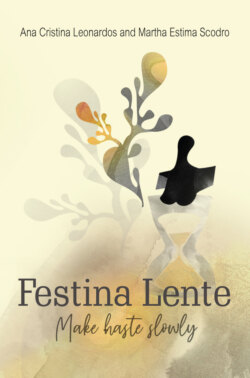Читать книгу Festina Lente - Ana Cristina Leonardos - Страница 16
На сайте Литреса книга снята с продажи.
Starting with Zeno
ОглавлениеOne must be 50 in order to talk about middle age and to feel it surrounding us. One must awaken one day without the certainties that once consoled us, and experience some degree of helplessness.
Reading and researching about the theme of middle age makes more sense when our joints start failing us, signaling that some form of action is urgent.
If being born, growing, “teen aging”, and aging exist, it seems timely for us to propose a “middle aging”.
We only name what we know. When we name something, we control the meaning and the function of the things; we seize for ourselves that which until then had been strange to us. Even though the perceptions in this stage can seem distorted and hyperbolic to the eyes of others, middle age only lets itself be known by successive approximations. It turns out to be unequal for each woman.
So upon turning 52, that was how I, Ana Cristina, decided to make use of my research training to better understand what was happening to me.
The idea of forming a partnership to share this moment of reading and studying the subject seemed to make perfect sense to me. Martha — a psychologist and colleague and friend from my generation, who had the same eagerness to learn and delve into different topics — accepted the challenge.
***
After some lunches with Ana we had our first conversation about what it would be like to study this topic and what to do with it.
We started with the Greek philosopher Zeno. She wasn’t here to joke around!
We discussed the paradox of the arrow: an archer aims at a target and launches the arrow from his bow. At each particular instant of time the arrow occupies a defined space. This means that, at each finite time, the arrow is at rest. Now, how do you understand that it is both at rest and moving? Does movement generate rest? Is rest a condition for movement? Does the arrow hit the target or never reach it?
Time was there, pulling us, pushing us, paralyzing us, and always challenging us to understand it.
The paradoxes and dualities of our fifties were springing up everywhere.
A restlessness in the air, a vague discomfort, a feeling of “we’re there” but, what now? Will the best or the worst part start now?
Each of us looked at our fifties suspiciously, proud, happy, irritated, hopeful, disillusioned. Like the sphinx, these years returned, defiantly, our gaze: decipher us or we will devour you.
***
Our generation of women — post Simone de Beauvoir, post equal working conditions, post stable union law, post hormonal replacement, post artificial insemination and post freezing of eggs, post acceptance of new sexualities, post increase in average life expectancy, post digital revolution; in short, post everything and many things — stepped into our fifties with both feet, and we didn’t have to knock to enter: the door was open.
The perspectives of the researcher and the psychologist overlapped, complemented each other, approached each other, withdrew from each other. The more we read, the more our topic grew.
To our main search (women and their fifties), we were quickly and disorderly incorporating keywords: middle age, menopause, life stories, perceptions of the empty/full nest, self-esteem, life expectancy, aging, longevity, new professions, and losses.
At the same time, the meta-work was being built and our fifties advanced to the rhythm of Kronos and Kairos.
We immersed ourselves in readings, and with them came the first writings, which further amplified our doubts. With each reading it became clearer that our curiosity revolved around what women were thinking.
How will the less exposed sides of these women be mapped? How will the faces of the feminine that reveal themselves from the epidermis inward be researched? What are their main reflections at this moment in life? What great worry does our fifties evoke?
These were some of the questions that echoed in our curious minds. When seeking the barely perceivable, the anticipated, we knew that we would have to start from the real and concrete.
At the end of an afternoon of work we looked exhausted and a little discouraged. How would we proceed?
And once again we thought about the first three lines of the Divine Comedy: either we find a Virgil or we will not move forward. Neither toward hell nor toward heaven.
Our work was in definite need of an external interlocutor. And it was under the guidance of Saul Fuks — Doctor in Clinical Psychology and Director of the Master’s Degree in Systemic Thinking at the National University of Rosario, Argentina — that we encountered some important clues and, above all, we understood that we would have to personally find — face-to-face, step-by-step — other women from our generation and talk with them.
And so we went to find them.
